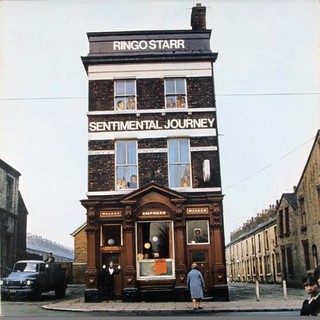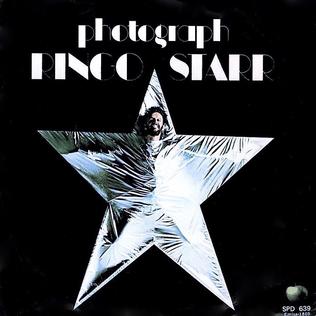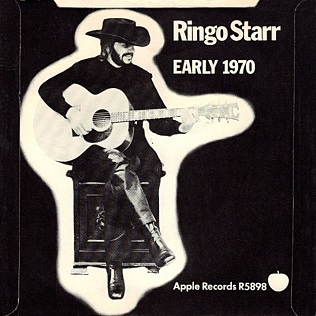Related Research Articles

Dark Horse is the fifth studio album by English rock musician George Harrison. It was released on Apple Records in December 1974 as the follow-up to Living in the Material World. Although keenly anticipated on release, Dark Horse is associated with the controversial North American tour that Harrison staged with Indian classical musician Ravi Shankar in November and December that year. This was the first US tour by a member of the Beatles since 1966, and the public's nostalgia for the band, together with Harrison contracting laryngitis during rehearsals and choosing to feature Shankar so heavily in the programme, resulted in scathing concert reviews from some influential music critics.

The discography of English singer-songwriter and former member of the Beatles, George Harrison consists of 12 studio albums, two live albums, four compilation albums, 35 singles, two video albums and four box sets. Harrison's first solo releases – the Wonderwall Music film soundtrack (1968) and Electronic Sound (1969) – were almost entirely instrumental works, issued during the last two years of the Beatles' career. Following the band's break-up in April 1970, Harrison continued to produce recordings by his fellow Apple Records acts, notably former bandmate Ringo Starr. He recorded and collaborated with a wide range of artists, including Shankar, Bob Dylan, Eric Clapton and Gary Wright.

Sentimental Journey is the debut solo album by English rock musician Ringo Starr. It was released by Apple Records in March 1970 as the Beatles were breaking up. The album is a collection of pre-rock 'n' roll standards that Starr recalled from his childhood in Liverpool. As a departure from the experimental quality that had characterised solo LPs by George Harrison and John Lennon since 1968, it was the first studio album by an individual Beatle to embrace a popular music form.

"It Don't Come Easy" is a song by English rock musician Ringo Starr that was released as a non-album single in April 1971. It was produced by Starr's former Beatles bandmate George Harrison, who also helped write the song, although only Starr is credited. Recording for the track took place in March 1970 at Trident Studios in London, with overdubs added in October. Starr and Harrison performed the song together in August 1971 at Harrison's Concert for Bangladesh shows in New York City, a recording from which was released on the live album of the same name. Starr has continued to perform it in subsequent decades with his All-Starr Band.

"Photograph" is a song by English rock musician Ringo Starr that was released as the lead single from his 1973 album Ringo. Starr co-wrote it with George Harrison, his former bandmate from the Beatles. Although they collaborated on other songs, it is the only one officially credited to the pair. A signature tune for Starr as a solo artist, "Photograph" was an international hit, topping singles charts in the United States, Canada and Australia, and receiving gold disc certification for US sales of 1 million. Music critics have similarly received the song favourably; Stephen Thomas Erlewine of AllMusic considers it to be "among the very best post-Beatles songs by any of the Fab Four".

The Best of George Harrison is a 1976 compilation album by English musician George Harrison, released following the expiration of his EMI-affiliated Apple Records contract. Uniquely among all of the four Beatles' solo releases, apart from posthumous compilations, it mixes a selection of the artist's songs recorded with the Beatles on one side, and later hits recorded under his own name on the other.
"I'm the Greatest" is a song written by English musician John Lennon that was released as the opening track of the 1973 album Ringo by Ringo Starr. With Starr, Lennon and George Harrison appearing on the track, it marks the only time that three former Beatles recorded together between the band's break-up in 1970 and Lennon's death in 1980. Lennon wrote the song in December 1970 as a wry comment on his rise to fame, and later tailored the lyrics for Starr to sing. Named after one of Muhammad Ali's catchphrases, the song partly evokes the stage-show concept of the Beatles' 1967 album Sgt. Pepper's Lonely Hearts Club Band.

"Back Off Boogaloo" is a song by English rock musician Ringo Starr that was released as a non-album single in March 1972. Starr's former Beatles bandmate George Harrison produced the recording and helped Starr write the song, although he remained uncredited as a co-writer until 2017. Recording took place in London shortly after the pair had appeared together at Harrison's Concert for Bangladesh shows in August 1971. The single was a follow-up to Starr's 1971 hit song "It Don't Come Easy" and continued his successful run as a solo artist. "Back Off Boogaloo" peaked at number 2 in Britain and Canada, and number 9 on America's Billboard Hot 100. It remains Starr's highest-charting single in the United Kingdom.

"Dark Horse" is a song by English rock musician George Harrison and the title track to his 1974 solo album on Apple Records. The song was the album's lead single in North America, becoming a top-20 hit in the United States, but it was Harrison's first single not to chart in Britain when issued there in February 1975. The term "dark horse" had long been applied to Harrison due to his unexpected emergence as the most accomplished solo artist of the four former Beatles following the band's break-up in 1970. In the song, however, he said he used the phrase in reference to gossip about someone who carries out clandestine sexual relationships. Commentators interpret the lyrics as a rebuttal to several possible detractors: Harrison's first wife, Pattie Boyd; reviewers who criticised the spiritual content of his 1973 album Living in the Material World; and his former bandmates John Lennon and Paul McCartney. Harrison named his Dark Horse record label after the song, and his 1974 North American tour with Ravi Shankar came to be known as the Dark Horse Tour.

"Ding Dong, Ding Dong" is a song by English rock musician George Harrison, written as a New Year's Eve singalong and released in December 1974 on his album Dark Horse. It was the album's lead single in Britain and some other European countries, and the second single, after "Dark Horse", in North America. A large-scale production, the song incorporates aspects of Phil Spector's Wall of Sound technique, particularly his Christmas recordings from 1963. In addition, some Harrison biographers view "Ding Dong" as an attempt to emulate the success of two glam rock anthems from the 1973–74 holiday season: "Merry Xmas Everybody" by Slade, and Wizzard's "I Wish It Could Be Christmas Everyday". The song became only a minor hit in Britain and the United States, although it was a top-twenty hit elsewhere in the world.

"Early 1970" is a song by English rock musician Ringo Starr that was released as the B-side of his April 1971 single "It Don't Come Easy". A rare example of Starr's songwriting at the time, it was inspired by the break-up of the Beatles and documents his relationship with his three former bandmates. The lyrics to the verses comment in turn on Paul McCartney, John Lennon and George Harrison as individuals, and the likelihood of each of them making music with Starr again. In the final verse, Starr offers a self-deprecating picture of his musical abilities and expresses the hope that all four will play together in the future. Commentators have variously described "Early 1970" as "a rough draft of a peace treaty" and "a disarming open letter" from Starr to Lennon, McCartney and Harrison.
"Sunshine Life for Me " is a song by English musician Ringo Starr from his 1973 album Ringo. It was written by George Harrison, Starr's former bandmate in the Beatles, and was one of several contributions Harrison made to Ringo. Recording for the song took place in Los Angeles in March 1973, with Richard Perry as producer. In addition to Starr and Harrison, the musicians on the track include Levon Helm, Robbie Robertson, Rick Danko and Garth Hudson of the Band, and multi-instrumentalist David Bromberg.

"Hari's on Tour (Express)" is an instrumental by English musician George Harrison, released as the opening track of his 1974 album Dark Horse. It was also the B-side of the album's second single – which was "Ding Dong, Ding Dong" in North America and most other territories, and "Dark Horse" in Britain and some European countries. Among Harrison's post-Beatles solo releases, the track is the first of only two genuine instrumentals he released from 1970 onwards – the other being the Grammy Award-winning "Marwa Blues", from his 2002 album Brainwashed.

"Learning How to Love You" is a song by English musician George Harrison, released in 1976 as the closing track of his debut album on his Dark Horse record label, Thirty Three & 1/3. Harrison wrote the song for Herb Alpert, sometime singer and co-head of A&M Records, which at the time was the worldwide distributor for Dark Horse. Although the relationship with A&M soured due to Harrison's failure to deliver Thirty Three & 1/3 on schedule, resulting in litigation and a new distribution deal with Warner Bros. Records, Harrison still dedicated the song to Alpert in the album's liner notes.
"Six O'Clock" is a song by English rock musician Ringo Starr from his 1973 album Ringo. It was written by Starr's former Beatles bandmate Paul McCartney and the latter's wife, Linda, who also participated in the recording of the song. It was the first time McCartney and Starr had worked together since the Beatles' break-up in 1970. Their collaboration reflected an easing of the tensions that had existed between the two musicians for much of that period.
"You and Me (Babe)" is a song by English musician Ringo Starr, released as the final track on his 1973 album Ringo. Starr's fellow ex-Beatle George Harrison wrote the song along with Mal Evans, the Beatles' longtime aide and a personal assistant to Starr during the making of Ringo. The track serves as a farewell from Starr to his audience in the manner of a show-closing finale, by lyrically referring to the completion of the album. During the extended fadeout, Starr delivers a spoken message in which he thanks the musicians and studio personnel who helped with the recording of Ringo – among them, Harrison, John Lennon and Paul McCartney, and his producer, Richard Perry.
"I'll Still Love You" is a song written by English rock musician George Harrison and first released in 1976 by his former Beatles bandmate Ringo Starr. Produced by Arif Mardin, the track appeared on Starr's debut album for Atlantic Records and Polydor, Ringo's Rotogravure. The composition had a long recording history before then, having been written in 1970 as "Whenever", after which it was copyrighted with the title "When Every Song Is Sung".
"So Sad" is a song by English rock musician George Harrison that was released on his 1974 album Dark Horse. Harrison originally recorded the song for his previous album, Living in the Material World, before giving it to Alvin Lee, the guitarist and singer with Ten Years After. Lee recorded it – as "So Sad " – with gospel singer Mylon LeFevre for their 1973 album On the Road to Freedom. The latter recording includes contributions from Harrison and marked the first of several collaborations between him and Lee.

"I Am Missing You" is a song by Indian musician Ravi Shankar, sung by his sister-in-law Lakshmi Shankar and released as the lead single from his 1974 album Shankar Family & Friends. The song is a rare Shankar composition in the Western pop genre, with English lyrics, and was written as a love song to the Hindu god Krishna. The recording was produced and arranged by George Harrison, in a style similar to Phil Spector's signature sound, and it was the first single issued on Harrison's Dark Horse record label. Other contributing musicians include Tom Scott, Nicky Hopkins, Billy Preston, Ringo Starr and Jim Keltner. A second version appears on Shankar Family & Friends, titled "I Am Missing You (Reprise)", featuring an arrangement closer to a folk ballad.

The Singles Collection 1962–1970 is a series of reissued singles by the English rock band the Beatles. It was released in Britain on 5 March 1976 by EMI, following the expiration of the Beatles' contract with the company in January, and close to six years after the band's break-up. The collection comprises all 22 of the Beatles' UK singles, which were originally issued between October 1962 and March 1970 on either the Parlophone or Apple record labels, together with a new single pairing "Yesterday" with "I Should Have Known Better".
References
- ↑ Madinger & Easter 2000, pp. 509, 510.
- ↑ Clayson 2003, pp. 270, 273.
- ↑ Schaffner 1978, p. 176.
- ↑ Woffinden 1981, pp. 78, 85.
- ↑ Madinger & Easter 2000, p. 442.
- 1 2 3 Doggett 2011, p. 224.
- 1 2 Rodriguez 2010, p. 249.
- ↑ Badman 2001, p. 103.
- ↑ Schaffner 1978, p. 161.
- ↑ Madinger & Easter 2000, p. 509.
- ↑ Mulligan, Brian (21 December 1974). "End To Beatles' Legal Hassle Due Soon". Billboard . p. 3. Retrieved 1 August 2017.
- ↑ Castleman & Podrazik 1976, pp. 148, 313.
- 1 2 Woffinden 1981, p. 81.
- 1 2 Clayson 2003, pp. 271–72.
- ↑ Badman 2001, p. 157.
- ↑ Woffinden, Bob (12 April 1975). "Ringo Starr: Everyone One Of Us Has All We Need ...". NME . Available at Rock's Backpages (subscription required).
- 1 2 3 Clayson 2003, p. 270.
- ↑ Badman 2001, p. 164.
- 1 2 Castleman & Podrazik 1976, p. 313.
- ↑ Harry 2004, p. 280.
- ↑ Madinger & Easter 2000, p. 493.
- ↑ Harry 2004, p. 295.
- ↑ Clayson 2003, pp. 272–73.
- ↑ Clayson 2003, p. 269.
- 1 2 Clayson 2003, p. 273.